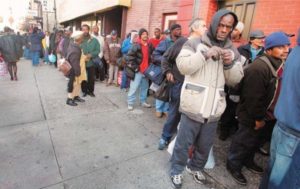
That is a question that hovers over much of the current debate about race in America and it’s one that the Pew Research Center posed to a wide swath of Americans in its latest study on politics and ideology.
Not surprisingly, how Americans answered that question depended on where they fell on the political spectrum. Liberals were more likely to agree that discrimination was still holding back African-Americans while conservatives overwhelmingly said it was not.
But it was with those whose identification wasn’t strictly liberal or conservative that things got interesting. The Pew Research Center divided the nation into seven political ideologies and found that among two typically Democratic-voting groups, there was widespread agreement that Blacks who can’t get ahead are mostly responsible for their own condition.
With a group Pew called the Democratic-leaning Next Generation Left, consisting of affluent young people who are liberal on most social issues but have reservations about social programs, 68 percent said Blacks are mostly responsible for their own condition.
Among the Hard-Pressed Skeptics, who are struggling financially and resentful of government and business though they support more generous government support for the poor and needy, 63 percent say that Blacks who can’t get ahead are mostly responsible for their own condition. In addition, 57 percent of the Faith and Family Left (the most racially diverse group, 30 percent of whom are Black) also say that Blacks who can’t get ahead are mostly responsible for their own condition.
Overall, 63 percent of those polled say “Blacks who can’t get ahead are mostly responsible for their own condition” while 27 percent say “racial discrimination is the main reason why many Black people can’t get ahead these days.”
The Pew study also found view on poverty and the poor also broke up along predictable ideological lines—86 percent of Steadfast Conservatives, 77 percent of Business Conservatives and 81 percent of Republican-leaning Young Outsiders say poor people have it easy. By contrast, 86 percent of Solid Liberals and 71 percent of Hard-Pressed Skeptics think the poor have hard lives and that benefits don’t go far enough to help them live decently.
There was a surprisingly positive view of immigrants across the ideological spectrum, with 57 percent of all participants agreeing that immigrants today strengthen rather than burden the country, while 35 percent disagreed. In addition, by a similar 59 to 35 percent margin, most believe that the growing number of newcomers strengthens society rather than threatens traditions.
On Vox.com, writer Max Fisher linked the findings of the study to the brilliant case Ta-Nehisi Coates made for reparations in The Atlantic magazine.
Fisher points out that “not only does discrimination continue today, but the consequences of two centuries of slavery and one century of explicit white supremacy still directly impact and hold back Black families.”
He adds this excerpt from Coates’ piece:
The lives of black Americans are better than they were half a century ago. The humiliation of Whites Only signs are gone. Rates of black poverty have decreased. Black teen-pregnancy rates are at record lows-and the gap between black and white teen-pregnancy rates has shrunk significantly. But such progress rests on a shaky foundation, and fault lines are everywhere. The income gap between black and white households is roughly the same today as it was in 1970. Patrick Sharkey, a sociologist at New York University, studied children born from 1955 through 1970 and found that 4 percent of whites and 62 percent of blacks across America had been raised in poor neighborhoods. A generation later, the same study showed, virtually nothing had changed. And whereas whites born into affluent neighborhoods tended to remain in affluent neighborhoods, blacks tended to fall out of them.
This is not surprising. Black families, regardless of income, are significantly less wealthy than white families. The Pew Research Center estimates that white households are worth roughly 20 times as much as black households, and that whereas only 15 percent of whites have zero or negative wealth, more than a third of blacks do. Effectively, the black family in America is working without a safety net. When financial calamity strikes-a medical emergency, divorce, job loss-the fall is precipitous.
And just as black families of all incomes remain handicapped by a lack of wealth, so too do they remain handicapped by their restricted choice of neighborhood. Black people with upper-middle-class incomes do not generally live in upper-middle-class neighborhoods. Sharkey’s research shows that black families making $100,000 typically live in the kinds of neighborhoods inhabited by white families making $30,000. “Blacks and whites inhabit such different neighborhoods,” Sharkey writes, “that it is not possible to compare the economic outcomes of black and white children.”


